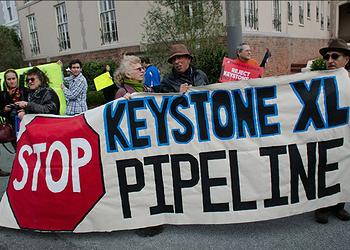
WASHINGTON, DC, June 28, 2016 (ENS) – This weekend, TransCanada moved forward with a lawsuit against the United States under the North American Free Trade Agreement, NAFTA, seeking US$15 billion in damages due to President Barack Obama’s rejection of the Keystone XL tar sands pipeline.
The Keystone XL Pipeline Project was a proposed 1,179-mile (1,897 km), 36-inch-diameter crude oil pipeline, beginning in Hardisty, Alberta, and extending south to Steele City, Nebraska. It was supposed to carry diluted bitumen from the Alberta tar sands to U.S. refineries.
Supporters said it would be good for the economies of both Canada and the United States. Opponents argued that burning the heavy crude oil would increase the risk of climate change.

After a seven year review process, on November 6, 2015, President Obama denied the required presidential permit for the Keystone XL Pipeline.
On January 6, 2016, TransCanada challenged that denial by announcing it had taken legal action under the North American Free Trade Agreement (NAFTA) and also initiated Constitutional litigation against the U.S. government.
TransCanada says it “remains committed to building the Keystone XL Pipeline.”
In its notice of intent to submit a claim under NAFTA, filed in January, TransCanada argues, “There was nothing unusual about the proposed pipeline or the oil it was intended to carry. In fact, the State Department has granted permits for three pipelines that carry oil produced from the same location (i.e., the oil sands in northeastern Alberta, Canada) and carry the same product (i.e., Western Canadian Sedimentary Basin (“WCSB”) crude oil) to the United States.”
“Environmental activists, however, turned opposition to the Keystone XL Pipeline into a litmus test for politicians—including U.S. President Barack Obama—to prove their environmental credentials,” TransCanada claims.
“The activists’ strategy succeeded,” TransCanada argues. “Seven years after Keystone filed its application, the United States denied the permit even though the Administration had concluded on six occasions that the pipeline would not have a significant impact on climate change. Stated simply, the delay and the ultimate decision to deny the permit were politically-driven, directly contrary to the findings of the Administration’s own studies, and not based on the merits of Keystone’s application. The Administration’s actions violated U.S. obligations under the North American Free Trade Agreement (“NAFTA”).”

Bill Snape, senior counsel with the nonprofit Center for Biological Diversity, is emphatic in his disagreement with TransCanada’s position, saying Monday, “This outrageous lawsuit by a money-hungry transnational corporation displays not only the depravity of the NAFTA provision that allows it, but also the depravity of imposing deadly tar sands oil upon the people of North America and the rest of the world.”
Under NAFTA, this lawsuit, which activists call “an attempt to charge American taxpayers billions for protecting their air and water,” will be decided by a “private, unaccountable tribunal.” This is also the process under the Trans-Pacific Partnership, a trade agreement among 12 Pacific Rim countries, including the United States, signed on February 4, 2016 in Auckland, New Zealand.
Chief among the U.S. activists who fought the Keystone XL pipeline to a standstill is Bill McKibben, co-founder of 350.org, a climate change action group. He objects not only to the pipeline and the heavy crude oil it would have carried, but also to the NAFTA adjudication process.
“The fight against Keystone was democracy at its best – a defense of science and sanity that involved millions upon millions of Americans,” McKibben said Monday. “That it can be overturned by three guys no one ever heard of or voted for, sitting in a room all by themselves, tells you everything you need to know about the fundamentally anti-democratic nature of these agreements. Anyone who supports the TPP after this has no excuses – TransCanada is making entirely clear what ‘free trade’ is all about.”

The U.S. anti-Keystone XL activists say they will take to the streets again to protest the lawsuit as they did for years to protest the pipeline.
Jane Kleeb, president of Bold Alliance, said, “President Obama stood with farmers, ranchers and Tribal Nations when he rejected the risky KXL pipeline. TransCanada has no right to sue the American people on the terms of us standing up for property rights and the impacts of climate change. Since NAFTA, just like TPP, are governed by secret courts, we will be in the streets standing up for the American values of property rights and clean water and standing up to the TransCanada bullies.”
Michael Brune, Sierra Club executive director, said, “TransCanada’s attempt to make American taxpayers hand over more than $15 billion because the company’s dirty Keystone XL pipeline was rejected shows exactly why NAFTA was wrong and why the even more dangerous and far-reaching Trans-Pacific Partnership must be stopped in its tracks.”
The Trans-Pacific Partnership must still be approved by Congress, and in the time between now and the Congressional votes, expected this summer, activists hope to persuade lawmakers to reject the pact.
“The TPP would empower thousands of new firms operating in the U.S, including major polluters, to follow in TransCanada’s footsteps and undermine our critical climate safeguards in private trade tribunals,” said Brune. “Today, we have a prime example of how polluter-friendly trade deals threaten our efforts to tackle the climate crisis, spotlighting the need for a new model of trade model that supports rather than undermines climate action. We urge our members of Congress to learn from this historic moment and commit to reject the TPP.”
Copyright Environment News Service (ENS) 2016. All rights reserved.
© 2016, Environment News Service. All rights reserved. Content may be quoted only with proper attribution and a direct link to the original article. Full reproduction is prohibited.
